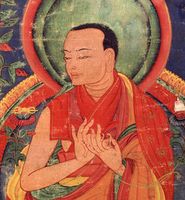'gro mgon chos rgyal 'phags pa: Difference between revisions
No edit summary |
No edit summary |
||
| Line 36: | Line 36: | ||
Pakpa remained in Mongolia after the death of his uncle in 1251. Godan's influence was on the wane, having lost succession first to his brother Guyug and again in 1251 to his cousin Mongke. In 1253 Mongke's brother, Khubilai invited Pakpa to his newly built city of Kaiping (latter known as Shangdu), presumably in part because he believed the Tibetan Buddhist lama could help justify the Mongol's rule of China. In fact the invitation had been for Sapan, but Pakpa went in his place. In 1254, on his way to meet the Khan, Pakpa went on a teaching tour in Kham where he visited various monasteries, converting several, including Dzongsar (dzong gsar) and Jyegu Dondrub Ling (skye dgu don grub gling) from Bon to the Sakya tradition. | Pakpa remained in Mongolia after the death of his uncle in 1251. Godan's influence was on the wane, having lost succession first to his brother Guyug and again in 1251 to his cousin Mongke. In 1253 Mongke's brother, Khubilai invited Pakpa to his newly built city of Kaiping (latter known as Shangdu), presumably in part because he believed the Tibetan Buddhist lama could help justify the Mongol's rule of China. In fact the invitation had been for Sapan, but Pakpa went in his place. In 1254, on his way to meet the Khan, Pakpa went on a teaching tour in Kham where he visited various monasteries, converting several, including Dzongsar (dzong gsar) and Jyegu Dondrub Ling (skye dgu don grub gling) from Bon to the Sakya tradition. | ||
Once Pakpa was settled at Khubilai's court, he gained a significant degree of influence and authority. Beginning in 1258 Pakpa performed Buddhist initiations and empowerments for the Khan and, in that same year, participated in a debate with leading Daoists. According to Tibetan historians Khubilai judged him to be the winner, a victory moved the Khan to burn Daoist texts and force prominent Daoists to convert to Buddhism. | Once Pakpa was settled at Khubilai's court, he gained a significant degree of influence and authority. Beginning in 1258 Pakpa performed Buddhist initiations and empowerments for the Khan and, in that same year, participated in a debate with leading Daoists. According to Tibetan historians Khubilai judged him to be the winner, a victory moved the Khan to burn Daoist texts and force prominent Daoists to convert to Buddhism. | ||
Revision as of 16:37, 9 January 2020
| PersonType | Category:Classical Tibetan Authors |
|---|---|
| MainNameTib | འགྲོ་མགོན་ཆོས་རྒྱལ་འཕགས་པ་ |
| MainNameWylie | 'gro mgon chos rgyal 'phags pa |
| AltNamesTib | འཕགས་པ་བློ་གྲོས་རྒྱལ་མཚན་ |
| AltNamesWylie | 'phags pa blo gros rgyal mtshan · chos rgyal 'phags pa · 'gro mgon 'phags pa blo gros rgyal mtshan · blo gros rgyal mtshan |
| AltNamesOther | Pakpa Lodro Gyeltsen · Chögyal Phagpa · Chögyal Phakpa · Chogyal Phagpa · Drogön Chögyal Phagpa · Drogon Chogyal Phagpa · Drogön Phagpa Lodrö Gyaltsen · Drogon Phagpa Lodro Gyaltsen |
| YearBirth | 1235 |
| YearDeath | 1280 |
| BornIn | Ngari |
| ReligiousAffiliation | Sakya |
| PersonalAffiliation | Sonam Gyeltsen (Father); Kunga Kyi (Mother); Sakya Paṇḍita Kunga Gyaltsen (Uncle) |
| BDRC | https://www.tbrc.org/#!rid=P1048 |
| Treasury of Lives | https://treasuryoflives.org/biographies/view/Pakpa-Lodro-Gyeltsen/2051 |
| Himalayan Art Resources | https://www.himalayanart.org/items/162 |
| IsInGyatsa | No |
| Other wikis |
If the page does not yet exist on the remote wiki, you can paste the tag |
Other Biographical Information[edit]
Biography from hhthesakyatrizin.org

